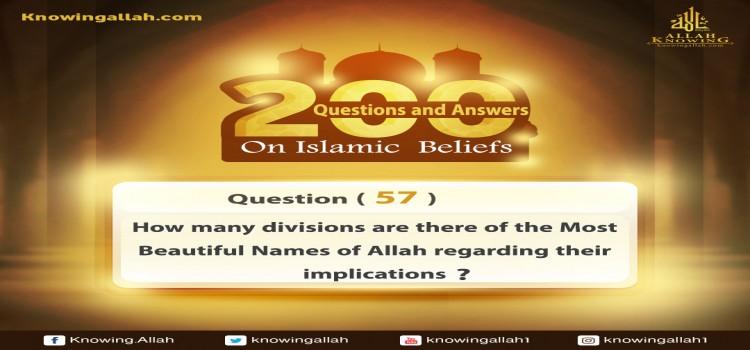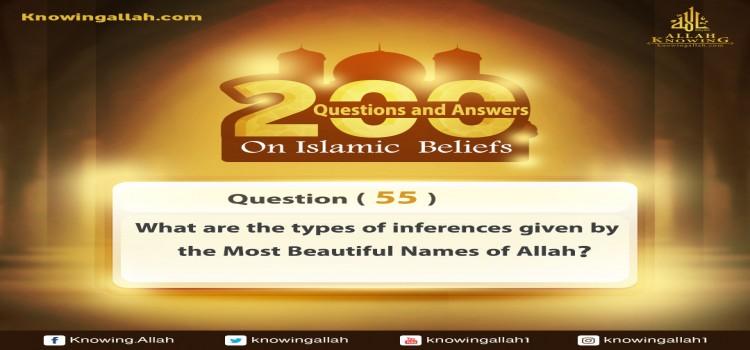Pauses of reflection upon the beautiful names of Allah
1. The believer should make his best effort to know Allah Almighty and His names, attributes, and actions, without negating, likening, distorting, or asking about their nature or manner.
His knowledge should be derived from the Qur’an and Sunnah and the authentic reports from the Companions (may Allah be pleased with them) and those who followed them with righteousness.
2. The names of Allah Almighty should be taken as they are reported, and not to be subject to our personal reasoning. Hence, we should take them as they are mentioned in the Qur’an and Sunnah, without addition or omission.
3. The beautiful names of Allah Almighty should not be regarded as limited or numbered, for there are other names and attributes which He, Exalted be He, keeps to Himself as part of the unseen, and they are not known to anyone, including angels and prophets. A Hadīth reads in part of it:
“... I ask You by every name that belongs to You, which You have named Yourself with, revealed in Your Book, taught any one of Your creation, or kept to Yourself in the knowledge of the unseen with You...”
[Narrated by Al - Tabarāni in Al - Mu‘ jam al - Kabīr; Sa hīh (aut hentic)]
“... I ask You by every name that belongs to You, which You have named Yourself with, revealed in Your Book, taught any one of Your creation, or kept to Yourself in the knowledge of the unseen with You...”
[Narrated by Al - T abarāni in Al - Mu ‘jam al - Kabīr; Sahīh (authentic)]
With regard to the Prophet’s Hadīth:
“Allah has ninety nine names, one hundred minus one, and whoever memorizes them will enter Paradise,”
[Narrated by Al- Bukhāri and Muslim]
this is a one complete statement, which indicates that whoever memorizes the ninety nine names will enter Paradise. Yet, this does not necessarily mean that they are only ninety nine and not more.
For example, we may say “so-and-so has a hundred slaves that he has prepared for Jihad.” This does not mean that he does not possess other slaves prepared for other purposes than Jihad. There is no disagreement among scholars on this point.
Moreover, the Prophet’s statement “and whoever memorizes them will enter Paradise” means:
Whoever memorizes and understands them and praises Allah Almighty thereby. These are three degrees. Whoever does any of them, along with sincere intention, and acts accordingly has indeed memorized them, as stated by Al-Qurtubi, Al-Khattābi, and Ibn al-Qayyim (may Allah have mercy upon them).
4. All the names of Allah Almighty are beautiful, and they fall under four categories:
First: Names of beauty:
They inspire within people’s souls a sense of intimacy, love for Allah and meeting Him, and feelings of comfort and tranquility.
They open the door of hope for people so they do not despair of Allah’s mercy.
Examples of these names include: Ar-Rahmān (the Most Compassionate), Ar-Rahīm (the Most Merciful), Al-Karīm (the Generous), Al-
‘Afuww (the Pardoner), Al-Halīm (the Forbearing), Al-Ghafūr (the All-Forgiving), At-Tawwāb (the Accepting of repentance), etc.
Second: Names of majesty:
They inspire within people’s souls a sense of awe and fear from their Lord, as well as glorification and extolment of Him.
They carry the meanings of vanquishing, power, might, and greatness, such as: Al-‘Azīz (the All-Mighty), Al-Jabbār (the Compeller), Al-Qahhār (the Superb Vanquisher), Al-Qawiyy (the All-Powerful), Al-Kabīr (the Great), and Al-Mutakabbir (the Supreme).
Third: Names of lordship:
These are the names which prompt the believer to feel humbled before his Lord and that he is weak and a created being by Allah Almighty.
They point to the lordship of Allah Almighty, such as: Ar-Rabb (the Lord), As-Sayyid (the Master), Al-Malik (the King), Al-Mālik (the Ow
ner), Al-Khāliq (the Creator), Al-Bāri’ (the Initiator), and Ar-Rāziq (the Provider).
Fourth: Names of divinity:
These are the names which prompt the believer to feel that he is a slave of Allah Almighty and that Allah is the One worthy of being w
orshiped alone.
They contain the meanings of divinity, such as: Al-Ilāh (the God) and As-Samad (the Eternal Refuge).This classification is done on the basis of the meanings of these names. Yet all the names of Allah Almighty combine beauty, majesty, perfection, and greatness. They point to the Best and Most Sublime One to be described.
5. Each of these names establishes the attribute of perfection for Allah Almighty. Hence, His names are all beautiful, and His attributes point to His perfection, magnificence, and majesty, and His actions comprise wisdom, mercy, benefits, and justice.
6. None among the names of Allah Almighty signifies evil or deficiency.
Indeed, evil does not come from Him and is not part of His attributes or ascribed to His essence,and it does not exist in any of His actions. So, evil may not be attributed to His actions or attributes.
7. Allah Almighty commands His servants to supplicate Him by His names. He says:
{Allah has the Most Beautiful Names, so call upon Him by them...}
[Surat al - A ‘rāf: 180 ]
This includes the supplications of worship and the supplications of requests.
{Allah has the Most Beautiful Names, so call upon Him by them...}
[Surat al - A‘rāf: 180]
This includes the supplications of worship and the supplications of requests.
This is indeed one of the best and greatest acts of obedience and piety.
8. The beautiful names of Allah Almighty are not collectively listed in any Prophetic Hadīth.
We should stick to the rule that “the names of Allah Almighty should be derived from the Qur’an and Sunnah.”
9. The second edition comprises commentary on ninety nine names among the beautiful names of Allah Almighty, as agreed between Shaykh Muhammad ibn Sālih ibn ‘Uthaymīn, Dr. ‘Umar Sulaymān al-Ashqar, and Shaykh ‘Abdul-‘Azīz ibn ‘Abdullah ibn Bāz (may Alah have mercy upon them all) -or as agreed by two of the three.



